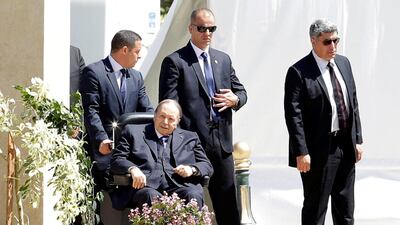Politics in Algeria has always been opaque, with the winner of every presidential election appointed by "le pouvoir", or "the power" – a shadowy group of kingmakers made up of army officials, business tycoons and intelligence. This process first began with the election of colonel Chadli Benjedid in February 1979 and has continued throughout the 20-year presidency of Abdelaziz Bouteflika.
But now, after months of wrangling and squabbling, these power brokers cannot reach a consensus regarding his future. So in a suspected liar's poker move, they have decided to hold a presidential election on April 18, 2019.
However, an enigma remains. The authorities have not indicated so far whether Algeria's frail president will stand for a fifth consecutive term. Mr Bouteflika’s decision will determine this election’s credibility.
Although the ruling coalition and the regime’s backers have been urging him to run again, the opposition –both Islamist and secular – do not think he is fit to do so.
Mr Bouteflika, 81, who has been paraplegic since suffering a stroke in 2013, only makes rare public appearances. He last addressed the nation more than six years ago and has travelled extensively to France and Switzerland to undergo medical treatment.
He has yet to announce his candidacy but according to the Algerian constitution, he has until March 4 to say whether he wants to seek a fifth term. Not that this is any indicator that he won’t run; in the 2014 election, he waited until the last few days before announcing his candidacy.
Ordinary Algerians are under no illusion that this marks any kind of change and are already anticipating Mr Bouteflika will emerge victorious if he decides to run again. However, if he does stand, it will be his last term. He will have to step down in 2024 after a two-term presidency cap was reintroduced in 2016.
More than 40 per cent of Algeria's 42 million-strong population are under the age of 25. Many know no other president than Mr Bouteflika. And when Amar Ghoul, a former cabinet minister, can shamelessly declare on television that the presidential election is “an affair of state”, the die, it seems, is already cast.
For Abdallah Djaballah, president of the opposition party El Adala, this election is a "big sham". Besides the serious concerns about his health, many opposition leaders question the achievements of a 20-year rule marked by corruption, nepotism, the absence of civil and political liberties, large-scale embezzlement, high unemployment and economic woes.
Despite the abundance of natural resources such as oil and gas – which account for 60 per cent of the budget and 94 per cent of export revenue – as well as phosphates and uranium, Algeria is grappling with systemic corruption and poor governance. The rising cost of living is another major challenge. And with the abrupt drop in oil prices after June 2014, the country's state-controlled economic model is failing and the government cannot preserve its subsidy programmes to maintain peace.
A 2018 World Bank report said social discontent, a government spending freeze, tax hikes and high unemployment posed a "substantial risk" to the country's economic future.
Whoever emerges victorious from the 2019 election faces the challenge of restoring the image of Algeria on the world stage as a symbol of the anti-colonial struggle for independence, as well as working hard and fast to diversify the economy, enliven a lethargic political system, launch a genuine democratic process, develop the tourism industry, increase stability not stagnation and significantly contribute to regional security.
So far, the 74-year old ex-prime minister Ali Benflis has announced his intention to run for president. He challenged Mr Bouteflika in vain in 2004 and again in 2014, when he denounced the ballot as “a rape of sovereignty”.
The first official candidate to throw his hat into the ring is the retired general Ali Ghediri, who has boosted his image with a series of interviews recently. In a discussion with the daily El Watan last month, he lambasted the two pillars of the Algerian system, Mr Bouteflika and his chief of staff Gaid Salah. He also criticised rumours that the election could be deferred and Mr Bouteflika's mandate prolonged and demanded that the army intervene.
These comments earned him a slap on the wrist from the chief of staff but huge support from the public. Some observers think he is a change-maker bringing hope for younger generations.
But if Mr Bouteflika decides to run, the status quo will be upheld – for now, at least.
Dr Abdelkader Cheref is an independent scholar based in the US

